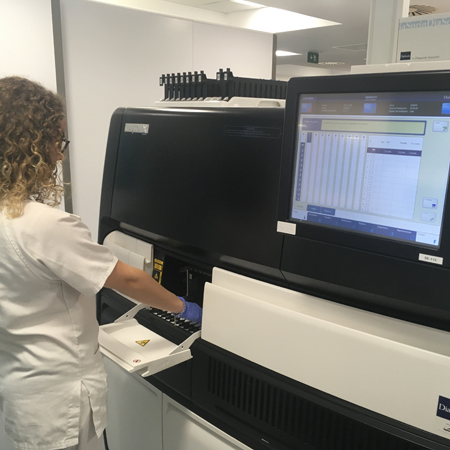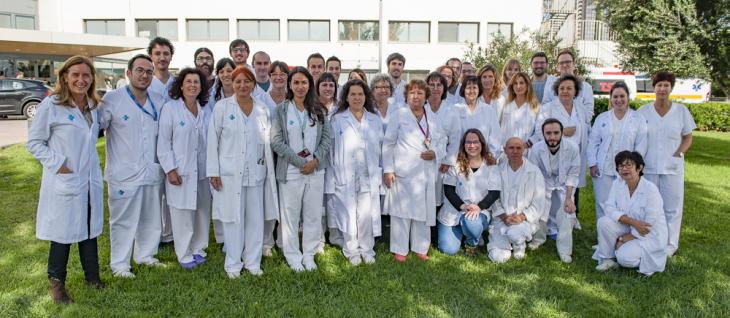
Introduction
The mission of the Microbiology Department is to provide the most efficient diagnosis resources for the study, treatment and prevention of infectious diseases. Microbiology is a multi-disciplinary medical speciality that combines knowledge of the etiology and pathogenesis of infections with knowledge of the technical advances for the faster, more precise identification of microorganisms causing infections, and the most effective antimicrobial treatments.
The Microbiology Department at the University Hospital of Bellvitge forms part of the Regional Clinical Laboratory of the Catalan Health Institute (ICS) Southern Metropolitan Healthcare Region. Along these lines, it receives samples and consultations on patients visiting the Bellvitge, Duran i Reinals, and Viladecans Hospitals, and from patients seen in the primary care centres of our healthcare area.
The Department is certified and operates in line with the requirements of Standard ISO-9001:2015 (Quality policy), and meetings the requirements of the Administrative Authorisation of the Generalitat de Catalunya, according to Decree 76/1995 of 7 March (Official Catalan Journal no. 2031, 29.3.1995), which sets forth the administration authorisation procedure for clinical laboratories and the regulations for their activities.
Its human and material resources are from the ICS, from the University of Barcelona, and from research projects funded by different competitive research organisations.
Team
Head of Service
Head of Section
Deputy Coordinator in the LCTMCS Management
Technical coordinator
Specialist Doctors
Relevant aspects
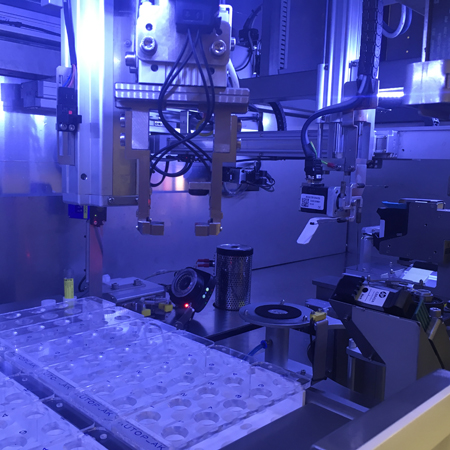
Pre-analytical and General Bacteriology Unit
- Pre-analytical automation: automated sample inoculating.
- Rapid antigen detection.
- Sample cultures taken from sterile and non-sterile parts of the body.
- Quantitative and qualitative cultures.
- Diagnosis of invasive fungal infection (detection of galactomannans and fungal culture).
- Diagnosis of sexually transmitted infections (STIs).
- Microscopic observation.
- Optimisation of laboratory information systems.
- Cryopreservation of bacteria of interest.
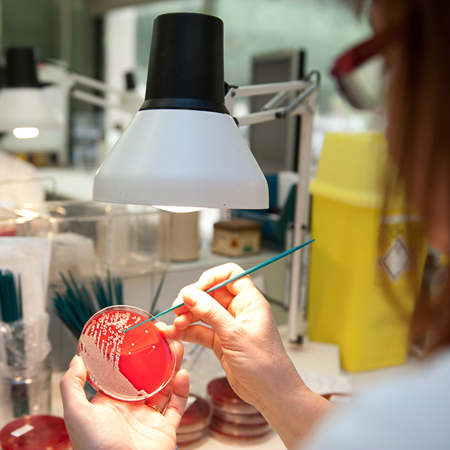
Special Bacteriology Unit
- Mass spectrometry (MALDI-TOF) applied to the identification of microorganisms.
- Rapid identification (vial) of positive haemocultures.
- Code Sepsis.
- Detection of multidrug-resistant bacteria carriers.
- Epidemiological surveillance of multidrug-resistant bacteria.
- Bacterial genotyping studies: PFGE, MLST and WGS (pulsed-field gel electrophoresis, multilocus-sequence typing and whole genome sequencing).
- Cryopreservation of bacteria of interest.
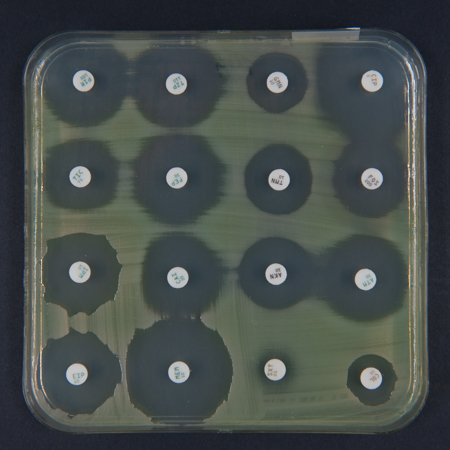
Antibiotics Unit
- Techniques for the study of antibiotic sensitivity through dis-diffusion, quantitative diffusion and microdilution.
- Phenotypic characterisation of antibiotic resistance mechanisms.
- Genetic characterisation of antibiotic resistance mechanisms.
- Regular information on the evolution of antibiotic sensitivity through microorganisms and through hospitalisation units.
- New antimicrobial activity studies.
- Active participation in the on-site programmes for the optimisation of antimicrobial use (PROA).
- Cryopreservation of bacteria of interest.
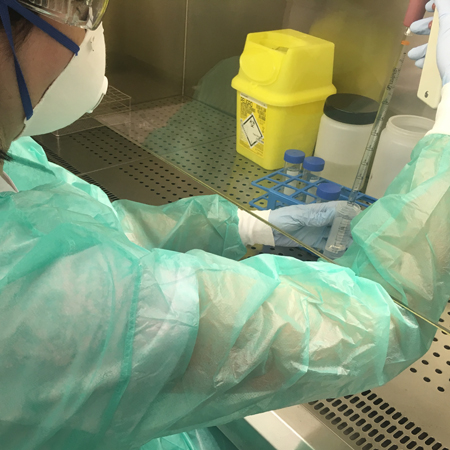
Tuberculosis and other Micobacteria Unit
- Biosafety level-3 (BSL-3) laboratory for the processing of samples that may contain agents that could cause severe illness from inhalation or contact.
- Rapid diagnosis of tuberculosis and real-time detection of antibiotic resistance using PCR.
- Diagnosis of tuberculosis infection by the interferon gamma release assay (IGRA).
- Study of antibiotic sensitivity to first- and second-line tuberculostatic drugs.
- Cryopreservation of bacteria of interest.
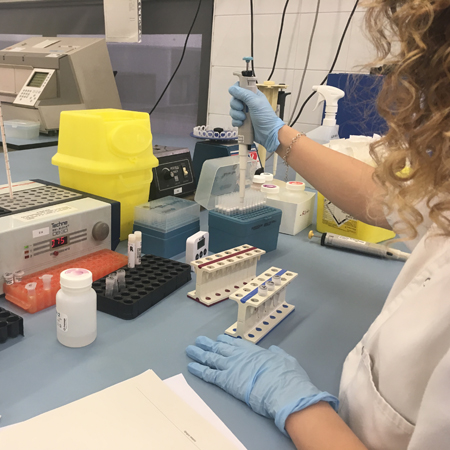
Virology and Molecular Diagnosis Unit
- Real-time detection of pathogens using PCR; pathogens related to STIs; respiratory pathogens; influenza; viral loads of HIV, Hepatitis C and B, EBV; viral and bacterial agents responsible for meningitis and encephalitis; enteric and C. difficile pathogens; and other agents of infectious diseases.
- Studies of HIV resistance to antiretroviral drugs.
- Genotyping of the Hepatitis C virus.
- Identification of bacteria, yeast and fungus by sequencing 16S regions and STIs.
- COVID-19: RT-PCR of SARS-CoV-2; Antigen detection; Sequencing of genetic variants of the virus.
Research
Lines of research
- Application of whole genome sequencing (WGS) to the study of bacteria epidemiology and antibiotic resistance mechanisms.
- Microbiome, metabolome and proteome applied to chronic respiratory infections and other infectious syndromes.
- Applications of new diagnosis techniques.
- Streptococcus pneumoniae: population dynamics, epidemiology, host-pathogen interactions, antibiotic resistance, impact of vaccines.
- Staphylococcus aureus: epidemiology, resistance mechanism, population dynamics, persistence and biofilm.
- Streptococcus spp: Overview of macrolide resistance.
- Characterisation of mobile genetic elements, dissemination between human and animal species
- Klebsiella pneumoniae: Epidemiology, hypervirulence, and resistance mechanisms.
- Haemophilus spp: Persistence, resistance, and population dynamics.
- Tuberculosis mycobacterium: diagnosis, prevention, and epidemiology
- Nontuberculosis mycobacterium: identification and diagnosis
Research groups
- Epidemiology of bacteria infections, research of pathogenesis and molecular basis of antimicrobial resistance. Group Head: M. Angeles Domínguez (Microbiology)
- Difficult to treat infections and use of antimicrobials. Group Head: Javier Ariza (Inf. Diseases)
- Respiratory infections and infections in the immunocompromised host. Group Head: Jordi Carratalà (Inf. Diseases)
Research networks
- Biomedical Research Centre in the Respiratory Diseases Network (CIBERes; CB06/06/0037).
- Spanish Network of Research into Infectious Pathologies (REIPI). Carlos III Institute (RD12/0015/0008).
- Tuberculosis Research Unit of Barcelona. uiTB Foundation
- Consolidated Research Group of the Generalitat de Catalunya: Infectious Pathologies and Antibiotic Sensitivity Research Group. University and Research Grants Management Agency (AGAUR).
Main publications
- Alcaide F, Trastoy R, Moure R, González-Bardanca M, Ambroa A, López M, Bleriot I, Blasco L, Fernandez-García L, Tato M, Bou G, Tomás M; Mycobacterial and GEMARA SEIMC/REIPI Bacterial Clinical Adaptation Study Group. Multiplex Real-Time PCR-shortTUB Assay for Detection of the Mycobacterium tuberculosis Complex in Smear-Negative Clinical Samples with Low Mycobacterial Loads. J Clin Microbiol. 2019 Jul 26;57(8).
-
Berbel D, Càmara J, García E, Tubau F, Guérin F, Giard JC, Domínguez MÁ, Cattoir V, Ardanuy C. A novel genomic island harbouring lsa(E) and lnu(B) genes and a defective prophage in a Streptococcus pyogenes isolate resistant to lincosamide, streptogramin A and pleuromutilin antibiotics. Int J Antimicrob Agents. 2019 Nov;54(5):647-651.
- Cubero M, Marti S, Domínguez MÁ, González-Díaz A, Berbel D, Ardanuy C. Hypervirulent Klebsiella pneumoniae serotype K1 clinical isolates form robust biofilms at the air-liquid interface. PLoS One. 2019 Sep 18;14(9):e0222628.
- González A, Càmara J, Ercibengoa M, Cercenado E, Larrosa N, Quesada MD, Fontanals D, Cubero M, Marimón JM, Yuste J, Ardanuy C. Emerging non-PCV13 serotypes causing adult invasive pneumococcal disease in the late-PCV13 period in Spain. Clin Microbiol Infect. 2019 Nov 19. pii: S1198-743X(19)30589-0.
- González-Díaz A, Tubau F, Pinto M, Sierra Y, Cubero M, Càmara J, Ayats J, Bajanca-Lavado P, Ardanuy C, Marti S. Identification of polysaccharide capsules among extensively drug-resistant genitourinary Haemophilus parainfluenzae Isolates. Sci Rep. 2019 Mar 14;9(1):4481. doi: 10.1038/s41598-019-40812-2.
Education
Degree education
The degree in medical Microbiology given by members of the Microbiology Department forms part of the University of Barcelona and the Bellvitge Health Sciences Campus. The professor are members of the Pathology and Experimental Therapy Department. Faculty of Medicine and Health Sciences: - Medicine Degree
- Podiatry Degree
- Dentistry Degree
Professors:
Fernando Alcaide, Adjunct Professor Carmen Ardanuy, Associate medical professor M. Angeles Dominguez, Associate medical professor Sara Marti, Associate Professor
Specialist healthcare training: Resident tutor: Calatayud Samper, Laura
Master's degrees and accredited courses
- University Master’s degrees:
University of Barcelona (IL3 Institute of Ongoing Training): Master’s degree in the management of infection prevention, surveillance and control programmes related to the Healthcare System. C. Ardanuy, MA. Dominguez / D. Berbel, J. Camara University of Barcelona/Autonomous University Master’s degree in Clinical Research. Specialising in Clinical Microbiology. F. Alcaide, MA. Domínguez / C. Ardanuy, S. Marti, J. Camara
- Management of master’s theses and Internships:
Autonomous University of Barcelona: Master’s degree in Microbiology. Faculty of Biology. University of Barcelona: Master’s degree in Advanced Microbiology. Faculty of Biology.
Location
Main Building at Bellvitge University Hospital
c/ Feixa Llarga, sn.
08907 L’Hospitalet de Llobregat. Barcelona
Floor 0
Telephone number 93 260 79 30

